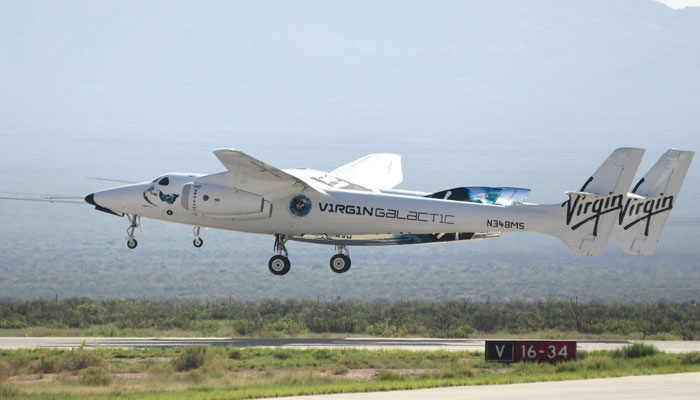Virgin Galactic's first flight for paying space tourists to launch tomorrow
The US-based spaceflight company aims to catch up in the race of space tourism by proving its safety
The Virgin Group's spaceflight company, Virgin Galactic, has announced that its rocket-powered aircraft, SpaceShipTwo, will finally begin transporting paying passengers to the edge of space.
Galactic 01, the first flight, is scheduled to take off as early as June 27, and if it successfully reaches the outer limits of space, the company's 20 years of hard work will have finally paid off.
The billionaire founder of Virgin Galactic, Richard Branson, initially declared his entry into the space tourism sector in 2004 with the intention of carrying paying passengers in 2007.
The company's progress was slowed down by delays and a fatal in-flight mishap.
Virgin Galactic has not flown a commercial flight yet, despite Branson's flight in July 2021 on SpaceShip Two. However, flights this summer will probably alter that.
After more than 800 customers waited in line and paid between $250,000 and $450,000 each, the business is now ready to open the cordon in their presence. However, it might already be too late to turn Virgin Galactic into a viable player in the space tourism industry.
“I do not have high hopes for Virgin Galactic’s long-term stability due to their excruciatingly slow pace to become operational, their high company expenses, and their mixed safety track record,” says Laura Forczyk, a space industry analyst and founder of the consultancy company Astralytical.
“I don’t think that their revenues are going to be able to catch up with their expenses unless there is a significant change in operations," he added.
Virgin Galactic was founded by Burt Rutan and his company, Scaled Composites, which designed and built SpaceShipOne, a suborbital spaceplane. They were later joined by Richard Branson after winning the $10 million Ansari X-Prize for two successful flights of SpaceShipOne within two weeks in 2004.
They later developed SpaceShip Two, a rocket-propelled spaceplane. The spacecraft detaches at 49,000 feet while being powered by a rocket, and uses a "feathering" system to glide back to Earth.
However, their innovative technology may have put them at a disadvantage in the space tourism market.
"They had way more technological problems with this less mature technology than they anticipated, and they had significant safety concerns," Forczyk says. "Traditional rockets have a long history of launching uncrewed as well as crewed spaceflight. Space planes do not have that history."
According to Pop Science, previously, on October 31, 2014, a SpaceShipTwo spacecraft called VSS Enterprise broke up in midair over the Mojave desert, killing one of the two test pilots on board.
This tragic event brought those safety concerns to the forefront. As a result of one of the pilots activating the feathering system too early during the test flight, the plane crashed, according to the National Transportation Safety Board.
Forczyk argues that space planes require human crews, unlike conventional rockets, increasing risk during development. He believes competition from Blue Origin may have caused Virgin Galactic to lag behind, as founder Jeff Bezos launched the New Shephard rocket in 2021, in the same month as Branson's space flight.
“They absolutely had competitors that took advantage of the fact that they were not online when they said they would be,” Forcyzk says.
Furthermore, Virgin Galactic aims to catch up in the space tourism race by raising capital and proving its safety and operations.
The company faces delays in flights this summer, but it must also prove the safety of its flights. According to Forcyzk, the business case relies on the public's perception of space tourists and researchers, as they lack another business opportunity.
Virgin Galactic was built in 2004 and can only fly space tourists and researchers, unlike Blue Origin and SpaceX, which launch satellites and astronauts.
-
Shanghai Fusion ‘Artificial Sun’ achieves groundbreaking results with plasma control record
-
Polar vortex ‘exceptional’ disruption: Rare shift signals extreme February winter
-
Netherlands repatriates 3500-year-old Egyptian sculpture looted during Arab Spring
-
Archaeologists recreate 3,500-year-old Egyptian perfumes for modern museums
-
Smartphones in orbit? NASA’s Crew-12 and Artemis II missions to use latest mobile tech
-
Rare deep-sea discovery: ‘School bus-size’ phantom jellyfish spotted in Argentina
-
NASA eyes March moon mission launch following test run setbacks
-
February offers 8 must-see sky events including rare eclipse and planet parade












